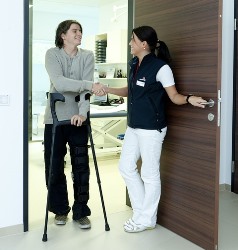How to Pick the Right LVN or LPN Training Program Near Boston Massachusetts
 Once you have decided on a rewarding career in the field of nursing, it's essential that you select a Licensed Practical Nurse (LPN) program near Boston MA that will furnish the right instruction. If you live in Texas or California, then you will be looking for a Licensed Vocational Nurse (LVN) school instead. There is no difference, apart from the names, between an LPN and an LVN. They both perform the same job functions and work in health care facilities under the guidance of Registered Nurses (RN) or Doctors. However their functions do fluctuate depending on the state they practice in, which we will talk about in the next segment. When starting their search for schools, many potential nursing students start with the ones that are the closest to their houses or that are the least expensive. Even though cost and location are important considerations, they are not the only qualifications that you should base your selection on. Other factors, for instance if the schools are accredited or have high pass rates on the licensing exam are extremely important too. There are additional questions that you should ask potential schools before enrolling in a LPN or LVN program that we will address later in this article. But to start with, let's have a look at the function of an LPN and what is involved in the training and licensing process.
Once you have decided on a rewarding career in the field of nursing, it's essential that you select a Licensed Practical Nurse (LPN) program near Boston MA that will furnish the right instruction. If you live in Texas or California, then you will be looking for a Licensed Vocational Nurse (LVN) school instead. There is no difference, apart from the names, between an LPN and an LVN. They both perform the same job functions and work in health care facilities under the guidance of Registered Nurses (RN) or Doctors. However their functions do fluctuate depending on the state they practice in, which we will talk about in the next segment. When starting their search for schools, many potential nursing students start with the ones that are the closest to their houses or that are the least expensive. Even though cost and location are important considerations, they are not the only qualifications that you should base your selection on. Other factors, for instance if the schools are accredited or have high pass rates on the licensing exam are extremely important too. There are additional questions that you should ask potential schools before enrolling in a LPN or LVN program that we will address later in this article. But to start with, let's have a look at the function of an LPN and what is involved in the training and licensing process.
It Only Takes a Few Minutes to Start Your LPN or LVN Career Below
What does an LPN or LVN Do?

Licensed Practical Nurses have many functions that they carry out in the Boston MA health facilities where they practice. As their titles signify, they are mandated to be licensed in all states, including Massachusetts. While they may be accountable for managing Certified Nursing Assistants (CNA), they themselves typically work under the oversight of either an RN or a doctor. The medical care facilities where they work are numerous and varied, such as hospitals, medical clinics, schools, and long-term care facilities. Anyplace that you can find patients seeking medical treatment is their domain. Each state not only regulates their licensing, but also what work activities an LPN can and can't perform. So based on the state, their day-to-day job activities might include:
- Measuring vital signs
- Giving medications
- Setting up IV drips
- Observing patients
- Collecting blood or urine samples
- Taking care of patient records
- Helping doctors or RNs with procedures
Along with their job functions being mandated by each state, the medical facilities or other Boston MA healthcare providers where LPNs work can additionally limit their job duties within those parameters. Additionally, they can work in different specialties of nursing, which include long-term care, critical care, oncology and cardiology.
LPN Courses
There are basically two academic credentials available that provide instruction to become an LPN or LVN near Boston MA. The one that may be completed in the shortest period of time, commonly about twelve months, is the certificate or diploma course. The next alternative is to earn a Practical Nursing Associate Degree. These LPN programs are more comprehensive in nature than the diploma option and usually require 2 years to complete. The benefit of Associate Degrees, in addition to providing a higher credential and more in-depth instruction, are that they furnish more transferable credit toward a Bachelor's Degree in nursing. Regardless of the type of credential you pursue, it needs to be state approved and ideally accredited by the National League for Nursing Accrediting Commission (NLNAC) or any other national accrediting organization. The NLNAC guarantees that the core curriculum adequately prepares students to become Practical Nurses, and that most graduates pass the 50 state required NCLEX-PN licensing exam.Enrolling in LPN and LVN Online Courses
 Enrolling in LPN schools online is growing into a more preferred way to get training and attain a nursing certificate or degree in Boston MA. Certain schools will require attending on campus for part of the training, and virtually all programs require a specified number of clinical rotation hours conducted in a local healthcare facility. But since the balance of the training can be accessed online, this option may be a more convenient answer to finding the time to attend classes for many students. Concerning tuition, a number of online degree programs are less expensive than other on campus choices. Even supplementary expenses such as for commuting and study materials can be minimized, helping to make education more economical. And a large number of online programs are accredited by U.S. Department of Education recognized organizations. So if your job and family commitments have left you with limited time to work toward your academic goals, it could be that an online LPN training program will make it more convenient to fit a degree into your hectic schedule.
Enrolling in LPN schools online is growing into a more preferred way to get training and attain a nursing certificate or degree in Boston MA. Certain schools will require attending on campus for part of the training, and virtually all programs require a specified number of clinical rotation hours conducted in a local healthcare facility. But since the balance of the training can be accessed online, this option may be a more convenient answer to finding the time to attend classes for many students. Concerning tuition, a number of online degree programs are less expensive than other on campus choices. Even supplementary expenses such as for commuting and study materials can be minimized, helping to make education more economical. And a large number of online programs are accredited by U.S. Department of Education recognized organizations. So if your job and family commitments have left you with limited time to work toward your academic goals, it could be that an online LPN training program will make it more convenient to fit a degree into your hectic schedule.
Questions to Ask LPN and LVN Schools
Now that you have decided on obtaining your LPN certificate, as well as if you will attend classes on campus or on the web, you can use the following checklist to start narrowing down your choices. As you undoubtedly realize, there are many nursing schools and colleges near Boston Ma as well as within Massachusetts and throughout the United States. So it is necessary to lower the number of schools to select from in order that you will have a manageable list. As we earlier mentioned, the location of the school and the cost of tuition are probably going to be the primary two points that you will look at. But as we also emphasized, they should not be your sole qualifiers. So prior to making your final decision, use the following questions to see how your selection measures up to the field.
- Accreditation. It's a good idea to make sure that the certificate program in addition to the school are accredited by a U.S. Department of Education recognized accrediting agency. Aside from helping confirm that you get a premium education, it may help in acquiring financial aid or student loans, which are frequently not offered for non-accredited schools near Boston Massachusetts.
- Reputation. Check online rating services to see what the reviews are for all of the LPN schools you are looking into. Ask the accrediting organizations for their reviews as well. In addition, get in touch with the Massachusetts school licensing authority to determine if there are any complaints or compliance issues. Finally, you can contact some local Boston MA healthcare organizations you're interested in working for after graduation and ask what their assessments are of the schools as well.
- Internship Programs. The best way to get experience as a Licensed Practical Nurse is to work in a clinical setting. Virtually all nursing degree programs require a certain number of clinical hours be completed. Many states have minimum clinical hour requirements for licensing too. Find out if the schools have associations with local Boston MA community hospitals, clinics or labs and assist with the positioning of students in internships. Also, it's important that you choose a school that offers clinical training in the type of facility you are most interested in. For example, if you want training and experience in pediatric care, make sure that the school you choose provides adequate clinical rotation in an area Pediatric Hospital.
- Licensing Preparation. Licensing criteria for LPNs vary from state to state. In all states, a passing score is needed on the National Council Licensure Examination (NCLEX-PN) in addition to graduation from an approved school. Certain states require a specified number of clinical hours be performed, as well as the passing of additional tests. It's essential that the school you are attending not only provides a top-notch education, but also readies you to satisfy the minimum licensing requirements for Massachusetts or the state where you will be practicing.
- Graduation and Job Placement Rates. Find out from the LPN programs you are considering what their graduation rates are as well as how long on average it takes students to complete their programs. A low graduation rate may be an indication that students were unhappy with the program and dropped out. It's also imperative that the schools have high job placement rates. A high rate will not only substantiate that the school has a superb reputation within the Boston MA medical community, but that it also has the network of relationships to help students gain employment.
- NCLEX Exam Pass Rate. Once you receive your certificate or diploma, you must sign up for and pass the National Council Licensure Examination for Practical Nurses (NCLEX-PN). Enrolling in a school with at least a 75% pass rate is highly preferred. Lower pass rates may indicate that a school’s program, curriculum or instructors are ineffective in teaching its students. You can find out from the school what their passing rate is for the last 5 years, or request the information from the State Board of Nursing.
Learn How to Become an LPN or LVN in Boston
Pick the Best Boston Licensed Vocational Nurse Training
Deciding on the right Licensed Practical Nurse school is arguably the most crucial phase to starting a new career in the medical care field. There are numerous factors that you need to take into account when choosing a nursing school. These aspects will be prioritized differently contingent on your current career objectives, lifestyle, and financial status. As we have stressed in this content, it is essential that you pick an LPN college and a certificate or degree program that are both accredited and have excellent reputations within the medical community. By utilizing our checklist of qualifying questions, you will be able to create a shortlist of schools to select from so that you can make your final selection. And with the proper degree and training, combined with your hard work and desire to succeed, you can become a Licensed Practical Nurse in Boston Massachusetts.
BOSTON LPN OR LVN COURSES ONLINE | BOSTON HOW TO BECOME AN LPN OR LVN
